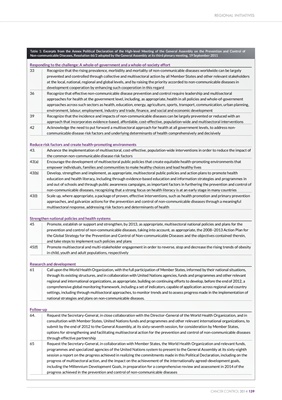
REGIONAL INITIATIVES
140 CANCER CONTROL 2014
‰ If accompanied by an attendant, the concession was
reduced to 50% for both the patient and the attendant -
issued as a combined ticket.
‰ The concession was offered to cancer patients travelling
for admission to hospitals or institutes or after discharge
from these institutions.
‰ In 1961, the concession was extended to outward and
return journeys i.e., the outward journey for admission to
the cancer hospital or institute or in connection with reexaminations
or periodical check-ups and the return
journey after discharge.
Since its inception the concession for cancer patients has
evolved in the following manner:
Year Concession
1969 A 75% concession was allowed on second
class mail and express trains.
1981 The same concession was extended to
both first class and second class.
1986 After the introduction of sleeper class, the
same concession was allowed for this.
2003 The same concession was extended to
3AC and AC CC and 50% concessions
were offered for 2A and 1A classes.
Present policy
At present cancer patients are eligible for 100% concession in
AC 3 tier/sleeper; a 75% concession on second class, AC Chair
Car; and a 50% concession in AC 2 tier and AC first class.
These are allowed on the basic fares of mail and express trains.
The escorts of cancer patients are also eligible for a 75%
concession in second class, sleeper, AC Chair Car, AC-3-tier
and a 50% concession AC 2 tier and AC first class. They are
allowed only on basic fares for mail and express trains.
The procedure for obtaining cancer patient concessions
Concessional tickets are issued on production of a certificate
from the head of a cancer hospital or institute where the
patient is being treated. Outward journey concessions are
issued from the station where the patient boards to the
hospital where they are being treated. The return journey
concessions are issued from the treatment/checkup/discharge
centre to the patient's place of residence.
A large number of cancer patients have been using this
facility. During 2012-13 approximately 1.5 million passengers
have used the concession; of which 900,000 passengers have
reserved tickets and nearly 600,000 passengers used unreserved
tickets. The total monetary value of concessions
given to cancer patients in 2012-13 was approximately US$
5.88 million (Rs 375 million).
Facilitating travel with reserved seating
Apart from the support given in the form of fare concessions,
Indian Railways also facilitates the travel of cancer patients by
providing a special quota of reserved seats. Such quota is
earmarked on approximately 150 mail and express trains
covering the major metros where the hospitals and institutes
for specialized treatment are located. In addition, cancer
patients who use the concessions are also given limited direct
access and preference in the allotment of an emergency quota
of seats which helps travel at very short notice. Therefore, to
some extent, cancer patients are given adequate priority over
the other categories of traveller including those travelling on
duty, senior officials, etc.
The figures cited above are impressive and encourage
further research. It would be interesting to know how many
other countries (high, middle or low income) are operating
similar concessionary fare programmes for cancer patients
and their carers. Even more importantly, what evidence there
is that providing cheaper or free travel for patients leads to
any or all of the following outcomes: downstaging at the point
of diagnosis; increased attendance and adherence to
treatment protocols; improved availability for follow-up and
improved survival rates? Cancer Control would be interested in
receiving summaries of these data from major treatment
hospitals in India whose patients are known to have benefited
from these concessionary fares. l
Sh Rajender Kataria is an officer with India's Administrative
Service. He has served in various capacities in State and Union
Governments including as Assistant Commissioner and SubDivisional Magistrate,
Joint Commissioner of Commercial Taxes,
Chief Executive Officer, Zila Parishad, and Deputy Commissionercum-District Magistrate.
He has also served as the Administrator
of two famous Temples - Mata Mansa Devi, Panchkula and Shri
Mata Sheetla Devi, Gurgaon, as well as Chief Administrator of
Haryana Urban Development Authority, Private Secretary and
Chief Staff Officer to Union Ministers of Labour and Employment,
Railways and Social Justice and Empowerment.
Mark Lodge became involved in evidence-based research as a
young member of the General Practice Research Group at the
Department of Public Health and Primary Care, University of
Oxford. In 1993 he joined the embryonic Cochrane
Collaboration, working as the Trials Register Co-ordinator. Mark
joined the INCTR as its Director for Programme Development
and is now the Executive Director of the UK Office with
responsibility for the Network's Evidence Base Programme. Mark
Lodge is an Associate Fellow, Particle Therapy Research Institute,
University of Oxford.